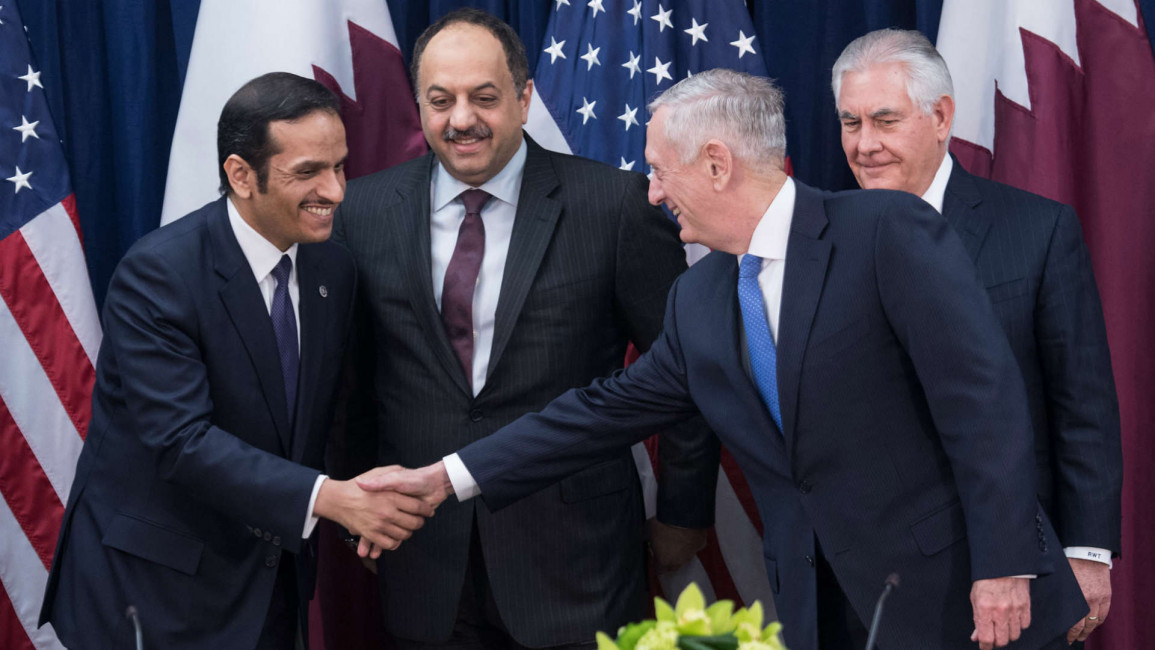Qatar-US alliance reaffirmed at end of Washington strategic dialogue
The US and Qatar signed three MoUs on Tuesday covering security cooperation and other issues, a move that signals a push for closer cooperation between the two countries, Reuters reported.
The meetings were part of the first inaugural US-Qatar Strategic Dialogue, which was held in Washington. Several Qatari ministers – including the foreign minister and economy minister – were joined by US Secretary of State Rex Tillerson and Defence Secretary James Mattis.
“A united Gulf Cooperation Council bolsters our effectiveness on many fronts, particularly on counterterrorism, defeating Daesh and countering the spread of Iran’s malign influence,” said Mattis, using an Arab acronym for Islamic State.
On 5 June, Saudi Arabia, the UAE, Bahrain and Egypt severed diplomatic and economic ties with gas-rich Qatar, accusing it of links to extremist groups.
Saudi Arabia then issued Qatar with a list of demands, including shutting down media outlets Al Jazeera and London-based The New Arab, curbing relations with Iran, and closing a Turkish military base in the emirate.
Qatar denies the charges and says the boycott is aimed at curtailing its sovereignty.
“This joint endeavor takes place despite the difficult circumstances that Qatar currently faces,” said Mohammed bin Abdulrahman al-Thani, Qatar’s foreign minister, during the event’s opening remarks.
Al Thani said Qatar was investing “more than $100 billion in America’s economy, including 10 billion earmarked for infrastructure”.
Al Thani's comments suggest Qatar could increase its investments if the blockade was lifted, reported Al Jazeera.
Tuesday’s meeting follows a Monday announcement by Qatar’s defence minister that the country plans to expand the Al-Udeid air base, which is already the largest US military base in the Middle East.
Regional observers have been vexed by the Trump administration’s position on the GCC crisis. In June, President Trump expressed support for the Qatar boycott, tweeting: “During my recent trip to the Middle East I stated that there can no longer be funding of Radical Ideology. Leaders pointed to Qatar – look!”.
In September, the US president changed tack and offered to mediate the GCC crisis. Earlier this month, Trump thanked Qatar’s emir during a phone call for his efforts combatting terrorism.
Tillerson and Mattis’ remarks suggest the State Department and Department of Defence want an end to the Gulf diplomatic crisis.
"The dispute has had direct negative consequences, economically and militarily for those involved, as well as the United States," he said.


![President Pezeshkian has denounced Israel's attacks on Lebanon [Getty]](/sites/default/files/styles/image_684x385/public/2173482924.jpeg?h=a5f2f23a&itok=q3evVtko)



 Follow the Middle East's top stories in English at The New Arab on Google News
Follow the Middle East's top stories in English at The New Arab on Google News


